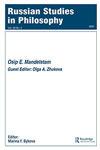Was Lev Tolstoy a Humanist?
IF 0.1
4区 哲学
Q4 Arts and Humanities
引用次数: 0
Abstract
ABSTRACT This article is devoted to understanding the typological status of Tolstoy’s ideas in the context of the evolution of European humanism from the Renaissance to existentialism, from the doctrine of “human dignity” to the conceptualization of man as a “self-directed project.” The author does not, however, attempt yet another revision of Tolstoy’s moral–religious doctrine or the creation of a precedent for negative reassessment of his significance and originality. The goal of the present article is to conduct a comprehensive analysis of Tolstoy’s anthropological views, to highlight their sources, argumentative characteristics, and nature of impact on the formation of the key theoretical standpoints and normative principles of the thinker’s ethical–philosophical doctrine. This is presented as an impersonalist understanding of a perfectionist transformation of human personhood through the expansion of its boundaries to the point of the universe’s infinitude. Tolstoy’s rejection of personhood and its goodness does not entail his exclusion from the ranks of humanist thinkers. The article draws conclusions about a new path for further development of humanist ideas. Tolstoyan thought not only anticipates the emergence of a “new” (existentialist) humanism, but it also demonstrates the clear advantages over it in the scale and consistency of its theoretical propositions and normative conclusions.列夫·托尔斯泰是人文主义者吗?
本文致力于理解托尔斯泰思想在欧洲人文主义从文艺复兴到存在主义、从“人的尊严”学说到将人概念化为“自我导向的工程”的演变过程中的类型学地位,尝试对托尔斯泰的道德-宗教学说进行另一次修正,或者开创一个对其意义和独创性进行负面重新评估的先例。本文的目的是对托尔斯泰的人类学观点进行全面的分析,以突出其来源、论证特征以及对思想家伦理哲学学说的关键理论立场和规范原则形成的影响性质。这是一种对人类人格的完美主义转变的客观理解,通过将其边界扩展到宇宙的无限点。托尔斯泰对人格及其善良的拒绝并不意味着他被排除在人文主义思想家的行列之外。文章总结了人文主义思想进一步发展的新路径。托尔斯泰思想不仅预示着一种“新”(存在主义)人本主义的出现,而且在其理论命题和规范结论的规模和一致性方面也显示出明显的优势。
本文章由计算机程序翻译,如有差异,请以英文原文为准。
求助全文
约1分钟内获得全文
求助全文
来源期刊

RUSSIAN STUDIES IN PHILOSOPHY
PHILOSOPHY-
CiteScore
0.10
自引率
0.00%
发文量
14
期刊介绍:
Russian Studies in Philosophy publishes thematic issues featuring selected scholarly papers from conferences and joint research projects as well as from the leading Russian-language journals in philosophy. Thematic coverage ranges over significant theoretical topics as well as topics in the history of philosophy, both European and Russian, including issues focused on institutions, schools, and figures such as Bakhtin, Fedorov, Leontev, Losev, Rozanov, Solovev, and Zinovev.
 求助内容:
求助内容: 应助结果提醒方式:
应助结果提醒方式:


